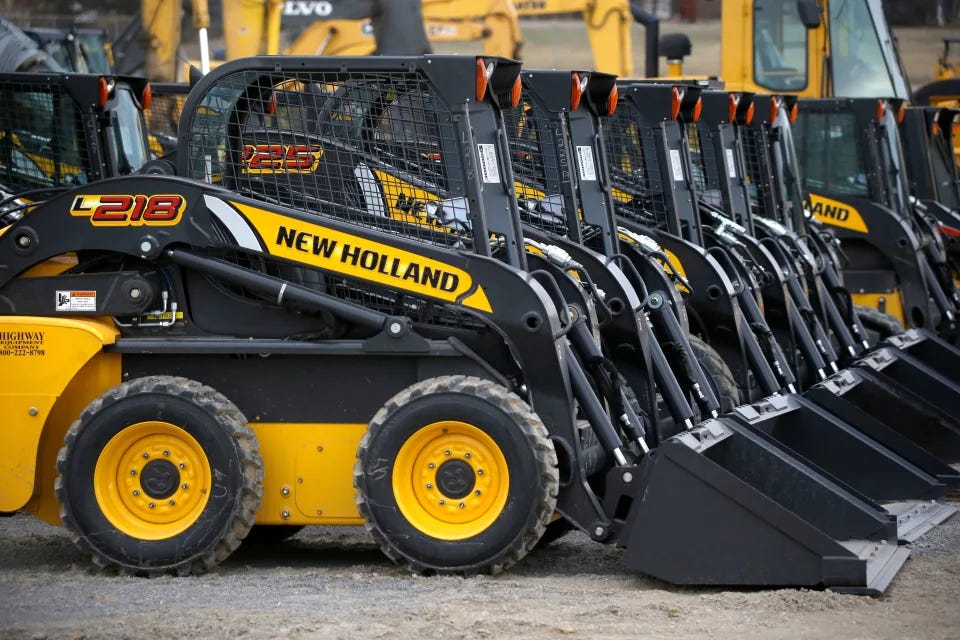UAW Strikers Told They Could Be Permanently Replaced If Latest CNH Deal Was Rejected
Company's 'improved' offer came with a caveat: We're ready to move forward, with or without you.
Was the threat of being permanently replaced what drove UAW strikers to finally accept CNH’s ‘last best and final offer’?
Members of United Auto Workers (UAW) locals 180 and 807 ratified a new contract with Case New Holland Industrial (CNH) over the weekend, ending a nearly 9-month strike that began on May 2nd last year.
Although the agreement is an improved version of the “last best and final” offer previously rejected on January 7th, it does establish a less generous and more expensive health insurance plan for new employees hired after September 2022
However, it may have been the threat of being permanently replaced that finally drove the striking UAW members in Iowa and Wisconsin to approve the contract by 62.4 percent to 37.6 percent.
“The agreement, which was voted on as an improved last, best, and final offer, provides wage increases, shift premium increases, classification upgrades as well as other improvements,” according to a UAW statement announcing the ratification.
While the contract offer was an improvement from the prior offer, “in reality, the ‘improved’ contract proposal was little changed from the ‘last, best and final offer’ workers voted down just two weeks ago,” notes WSWS.org writer Marcus Day.
“There were just a couple of minor things that had changed,” a worker at the CNH plant in Burlington told the WSWS. “We didn’t find out what had changed till the meeting before the vote. We get the ratification bonus in 30 days instead of 60 days, and one of the pay grades was changed. There wasn’t a whole lot that really changed.”
Notwithstanding the ‘improved’ offer, several articles (including the UAW’s statement) mention that, just before strikers voted on the company’s latest offer, workers received letters that stated if they did not vote to accept the offer, CNH would hire permanent replacement workers.
“Our negotiators tenaciously bargained to the very end,” UAW Vice President Chuck Browning, Director of the Agricultural Implement Department said, “even fighting for contract improvements in the face of threats from CNHI to hire permanent strike replacements.”
“Multiple workers say they received letters from the company Jan. 17, informing them that managers would hire permanent replacements if the union didn't vote to ratify an agreement by Jan. 23” reported the Des Moines Register (via Yahoo).
CNH operated the plants while the UAW was on strike
Underscoring the importance of the company’s alleged threat to permanently replace strikers is the fact that CNH was able to run its two plants while the UAW was on strike, reported EquipmentWord.com.
Both the Burlington and Racine CNH facilities remained operational throughout the strike. CNH brought in a temporary workforce within days of the strike to ensure the plants continued to operate. Even amid the strike, the company said its third-quarter profits jumped 22% to $559 million.
Union officials suggested the temporary workforce was assembled before the contract deadline, possibly in anticipation of the strike being called.
Temporary vs. Permanent Replacement Workers
While unions and their members have a legal right to strike, employers have had the right to hire replacement workers if needed since 1938.
As CNH utilized temporary replacement workers throughout the strike, which was over economic issues, had the UAW strikers rejected the company’s offer again, CNH may have been well within its legal rights to convert the temporary replacement workers into permanent replacement workers, and place the UAW strikers onto a recall list.
Here is what the National Labor Relations Board states about permanently replacing strikers:
Economic strikers defined. If the object of a strike is to obtain from the employer some economic concession such as higher wages, shorter hours, or better working conditions, the striking employees are called economic strikers. They retain their status as employees and cannot be discharged, but they can be replaced by their employer. If the employer has hired bona fide permanent replacements who are filling the jobs of the economic strikers when the strikers apply unconditionally to go back to work, the strikers are not entitled to reinstatement at that time. However, if the strikers do not obtain regular and substantially equivalent employment, they are entitled to be recalled to jobs for which they are qualified when openings in such jobs occur if they, or their bargaining representative, have made an unconditional request for their reinstatement. [Emphasis added.]
Whether the UAW strikers were moved by the company’s threat is unknown. However, it appears the UAW knew the risks.
Tracey Chew, a longtime CNH Industrial worker and UAW bargaining team member, told a WQAD 8 reporter: "We had a meeting with the legal department from Detroit."
"They came down and gave us the very long and short of it and told us what our options were [and] informed the membership of everything that could possibly go wrong. [After], we had a good question-and-answer forum,” Chew stated. “And then once legal was finished with their presentation, then we allowed to vote and we voted up until 6:00 p.m."
“But what Chew thinks motivated a good number of members to approve the offer was CNH Industrial saying it would hire ‘permanent replacement workers’ starting Jan. 23,” reported WQAD 8
Related:
What pushed through the Case-UAW contract, ending Iowa's longest strike in years?
UAW-CNH Industrial contract details revealed: Here's what workers agreed to
UAW rams through contract at CNH with new health care tier, shutting down nearly 9-month-long strike





